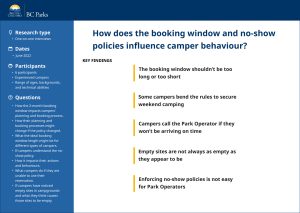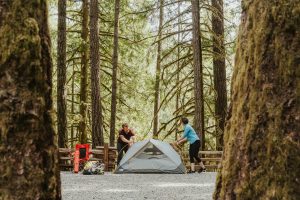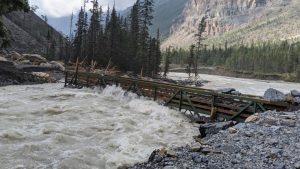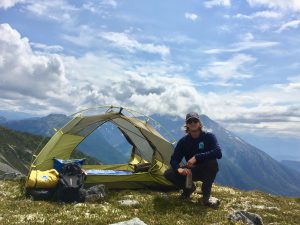Who visits B.C.’s backcountry, why do they go, and what do they experience there?
Categories:
Over the past three years, BC Parks established a program of ongoing design research that provides direct access to feedback from the people who use our services. We regularly share what we learn from our research sessions on this blog.
In March and April 2024, we conducted one-on-one research interviews with people who volunteered to take part in design research with BC Parks. In this post, we share what we learned about backcountry visitors and what motivates them to do this challenging activity.
Our goals were to:
- Dig deeply into people’s motivations, emotions, and guiding principle as they relate to backcountry camping.
- Learn how backcountry visitors find places to go and how they plan their trips.
During these interviews we asked participants to tell us about their experiences with backcountry camping, including:
- How they learn about new places to visit
- What their planning process looks like
- What they do to get ready for a backcountry camping trip
- How they feel when in the backcountry, and how it impacts their lives when they return home
- What is it about this activity that makes them want to keep doing it, despite all the discomfort and challenges that come along with it

People go to the backcountry for solitude, adventure, and a sense of peace
“Being part of nature is a crucial part of keeping my sanity and level of fitness.” – Research participant
“It fills me back up.” – Research participant
“It’s peaceful. It’s a reset.” – Research participant
Participants all shared the feeling of awe they get when they are in the backcountry surrounded by nature. Some said that it made them feel small, or that it made their everyday problems seem insignificant. Doing something challenging in nature also fosters deep connections between hiking companions and gives a shared sense of accomplishment when the trip is over.
Participants frequently used the following words to describe the backcountry:
- peaceful
- breathtaking
- beauty
- challenge
- adventure
- solitude
- freedom
People have a wide variety of experiences in the backcountry
“We packed our bags and practiced in the city to get a feel for where the aches and pains were.” – Research participant
“If you want to get away from people you have to do something that most people don’t want to do.” – Research participant
“It’s a weird feeling when getting off a boat and they turn around. It’s surreal knowing I have five days to get to the end. This is part of my enjoyment.” – Research participant
“If you want to get away from people you have to do something that most people don’t want to do.” – Research participant
We spoke to a wide range of people, from novices to experts, and found that people are having a wide variety of experiences in B.C.’s backcountry.
There are many different reasons why people choose to visit the backcountry and many different approaches to planning trips, making reservations, staying safe, attaining skills, and physical abilities.
There are some similarities in how people with similar levels of backcountry experience behave and think.

Novices
- Have only recently started to explore backcountry areas.
- May take their first backcountry trip with more experienced friends.
- Some tried backcountry camping to escape frontcountry crowds and avoid making reservations far in advance.
- Favour the most popular backcountry areas because they are easier to get to and novices feel safer with other people around.
Dedicated adventurers:
- Tend to visit less accessible backcountry areas to escape the crowds. However, they still stick to well documented trails and camping areas.
- Are likely to do a few backcountry trips every year.
- Are confident enough in their skills and experience to feel self-sufficient in the backcountry.
Wilderness seekers
- Driven by the desire to get away from people and urban environments.
- Very experienced and confident in their wilderness skills.
- Less aware of the borders or divisions between BC Parks, Crown Land, and other wilderness areas.
- Some charter a boat or plane to drop them off in remote places.
- May do solo trips.
Challengers
- Driven by the desire for a physical and emotional challenge.
- Often have a bucket list of destinations they want to complete.
- Enjoy difficult terrain.
Getting started in the backcountry can depend on who you know
“Backcountry camping is just what we did growing up. In my mind it was just camping. I didn’t think of it as backcountry.” – Research participant
“In grade 11 or 12 in high school, my teacher had a hiking group. He took us up to Kokanee hiking and camping overnight.” – Research participant
“I had my partner with me who had done it before. If it was both our first time, I would have been a little more nervous.” – Research participant
“We went to Garibaldi. We wanted to have some people around the first time, just in case.” – Research participant

Many avid backcountry campers grew up backcountry camping. Backcountry campers with children of their own tend to have a strong desire to pass their love of the backcountry on to their children, taking them out as soon as they are old enough to walk.
Others had their first experience in the backcountry on a school trip and liked it enough to continue exploring the backcountry on their own.
Adult first-timers often get introduced to backcountry by more experienced friends. However, many experienced backpackers are reluctant to take first-timers with them. With the time and effort that goes into planning a backcountry trip, they don’t want to be held back by their friend’s lack of experience. Some people also said that they don’t want to be responsible for another person’s safety.
Some people learn to backcountry camp without the help of a friend or teacher. This was rare among our participants. There are lots of barriers for first-timers who want to take that leap. They need to learn where to go, how to stay safe, what gear they need, and how much weight they can carry. It can be hard to find answers to those questions without a more experienced backpacker to help.
Backcountry campers need flexibility to change plans if the weather changes
“Always book ahead of time. I don’t want to hike my stuff all the way up there and then find there’s no place to sleep.” – Research participant
“I prefer to have a reservation if I’m with my kids — I can’t turn back if there are no sites.” – Research participant
“It’s hard to book in advance. I don’t know what the weather will be 6 months from now.” – Research participant
“Once you get a permit, you’re stuck with the date. If the weather turns, I don’t want to go.” – Research participant
People hiking with children or people who are new to backcountry tend to be more enthusiastic about making reservations. They are less likely to leave things up to chance and want to make sure a campsite is available to them when they arrive.
Other backcountry visitors prefer not to have to make a reservation or register for a permit in advance. They don’t want to plan too far ahead because they don’t want to be locked into going out in bad weather.
Participants told us that, in the backcountry, bad weather can be dangerous, so they need to shift their plans accordingly.
Permit needs for BC Parks backcountry areas can be confusing
“It’s not clear what the difference is between reservation and registration. It’s confusing when to do which. I make a best guess.” – Research participant
People know that a reservation guarantees a spot in a campground, but it is not always clear when one is needed for backcountry camping.
Registration (permits) can be confusing:
- Participants were unclear about why they needed to register, guessing the permits may be for crowd control, safety, or paying for services.
- The information BC Parks provides about the process for getting a permit or how to display it is not clear, especially for someone new to backcountry. This confusion can become a deterrent for some to get permits.
Parking concerns can deter people from going to some parks
“I arrived at 10am with a permit but we couldn’t do our trip as there was no parking.” – Research participant
“I choose where we would go based on the safety of the parking lot and location.” – Research participant
Parking is an area of concern for a couple of reasons:
- At parks that have popular day-use areas, the parking lots may be full of day visitors, so backcountry campers can’t find a place to leave their car.
- Other backcountry campers are concerned about break-ins, and many check how safe the parking lot is before deciding to do a trip.
What’s next?
We will develop visitor archetypes based on our findings in this research as well as research we are doing with other types of park visitors. Archetypes are representations of groups of visitors and may include information on visitors’ guiding principles, inner thinking, emotional reactions, behaviours, goals, and pain points. These archetypes can be a valuable tool to help our teams consider different visitor types and points of view when making decisions.
More design research posts
Interested in design research at BC Parks? Read our previous design research posts.
How can you take part in our research?
Volunteer for one-on-one research sessions
We are always looking for people who would like to take part in our design research activities. If you’re interested in one-on-one research, you can sign up using this form.
We contact people from our volunteer list at random, so we can’t promise that you will be selected for this type of research.





